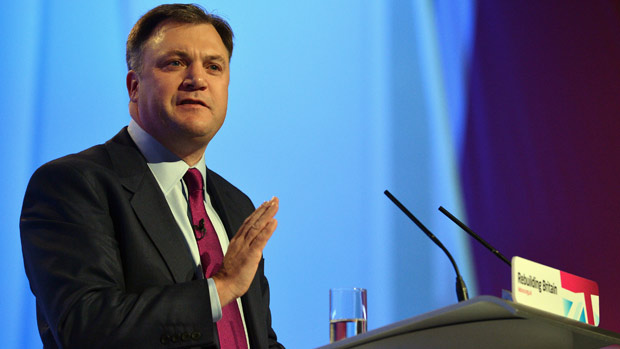Ed Balls plans 'symbolic' child benefit cut to balance books
Ministers' pay also slashed by five per cent in Labour's bid to show tough stance on austerity

A free daily email with the biggest news stories of the day – and the best features from TheWeek.com
You are now subscribed
Your newsletter sign-up was successful
The Labour Party is due to announce plans for a real-term cut to child benefit if it wins the next general election in a bid to persuade voters that it can be as tough as the Tories when it comes to austerity.
At the party's conference in Manchester today, shadow chancellor Ed Ball is expected to announce that child benefit will only rise by one per cent in the first two years of an incoming Labour government.
The Independent says the cap, which is less than the current retail price index of 2.4 per cent, risks a "backlash" from women voters.
The Week
Escape your echo chamber. Get the facts behind the news, plus analysis from multiple perspectives.

Sign up for The Week's Free Newsletters
From our morning news briefing to a weekly Good News Newsletter, get the best of The Week delivered directly to your inbox.
From our morning news briefing to a weekly Good News Newsletter, get the best of The Week delivered directly to your inbox.
"The highly symbolic move on child benefit is designed to persuade voters that Labour could be as tough as the Tories in making sensitive cuts," it adds.
The BBC notes that the move is essentially an extension of a cap already put in place by the coalition government. The current limit of one per cent for child benefit rises is due to expire in 2016, but Labour's move would see it continue for another year. The £400m saved would be used to help cut the deficit.
Child benefit is currently £20.50 a week for a first child, plus £13.55 a week for each other child.
Balls is expected to warn that all sections of society will have to make sacrifices to balance the nation's books and that Labour's task is "not to flinch from the tough decisions we must make and to show the country that there is a better way forward".
A free daily email with the biggest news stories of the day – and the best features from TheWeek.com
The shadow chancellor will also announce plans to cut the salaries of government ministers by five per cent, starting in May 2015. Ministerial pay would be frozen until the nation's books are balanced, which Labour predicts will be done by 2020, saving around £300,000 each year.
The Conservatives have pointed out that this saving amounts to just 0.003 per cent of the deficit.
Labour sources have also told The Guardian that Labour is likely to commit extra funding for the NHS, possibly by reintroducing the 50p top rate of tax.
Balls's speech comes after the party's announcement that the national minimum wage would rise from £6.50 an hour to £8 an hour by 2020.
-
 Political cartoons for February 16
Political cartoons for February 16Cartoons Monday’s political cartoons include President's Day, a valentine from the Epstein files, and more
-
 Regent Hong Kong: a tranquil haven with a prime waterfront spot
Regent Hong Kong: a tranquil haven with a prime waterfront spotThe Week Recommends The trendy hotel recently underwent an extensive two-year revamp
-
 The problem with diagnosing profound autism
The problem with diagnosing profound autismThe Explainer Experts are reconsidering the idea of autism as a spectrum, which could impact diagnoses and policy making for the condition
-
 How corrupt is the UK?
How corrupt is the UK?The Explainer Decline in standards ‘risks becoming a defining feature of our political culture’ as Britain falls to lowest ever score on global index
-
 Reforming the House of Lords
Reforming the House of LordsThe Explainer Keir Starmer’s government regards reform of the House of Lords as ‘long overdue and essential’
-
 How long can Keir Starmer last as Labour leader?
How long can Keir Starmer last as Labour leader?Today's Big Question Pathway to a coup ‘still unclear’ even as potential challengers begin manoeuvring into position
-
 The high street: Britain’s next political battleground?
The high street: Britain’s next political battleground?In the Spotlight Mass closure of shops and influx of organised crime are fuelling voter anger, and offer an opening for Reform UK
-
 Is a Reform-Tory pact becoming more likely?
Is a Reform-Tory pact becoming more likely?Today’s Big Question Nigel Farage’s party is ahead in the polls but still falls well short of a Commons majority, while Conservatives are still losing MPs to Reform
-
 The launch of Your Party: how it could work
The launch of Your Party: how it could workThe Explainer Despite landmark decisions made over the party’s makeup at their first conference, core frustrations are ‘likely to only intensify in the near-future’
-
 What does the fall in net migration mean for the UK?
What does the fall in net migration mean for the UK?Today’s Big Question With Labour and the Tories trying to ‘claim credit’ for lower figures, the ‘underlying picture is far less clear-cut’
-
 Will the public buy Rachel Reeves’s tax rises?
Will the public buy Rachel Reeves’s tax rises?Today’s Big Question The Chancellor refused to rule out tax increases in her televised address, and is set to reverse pledges made in the election manifesto